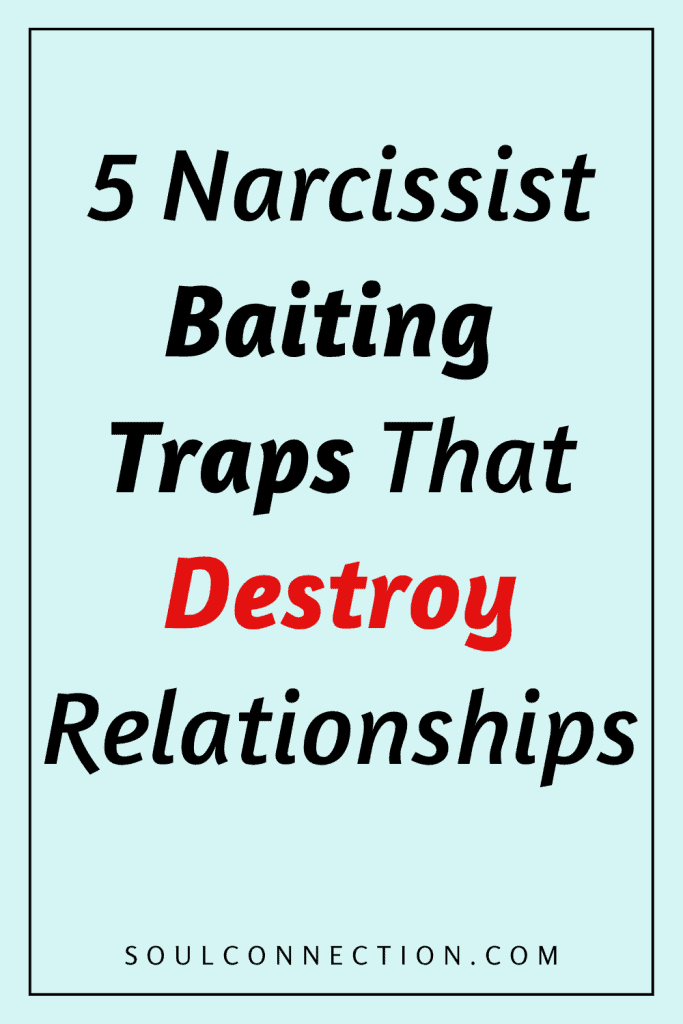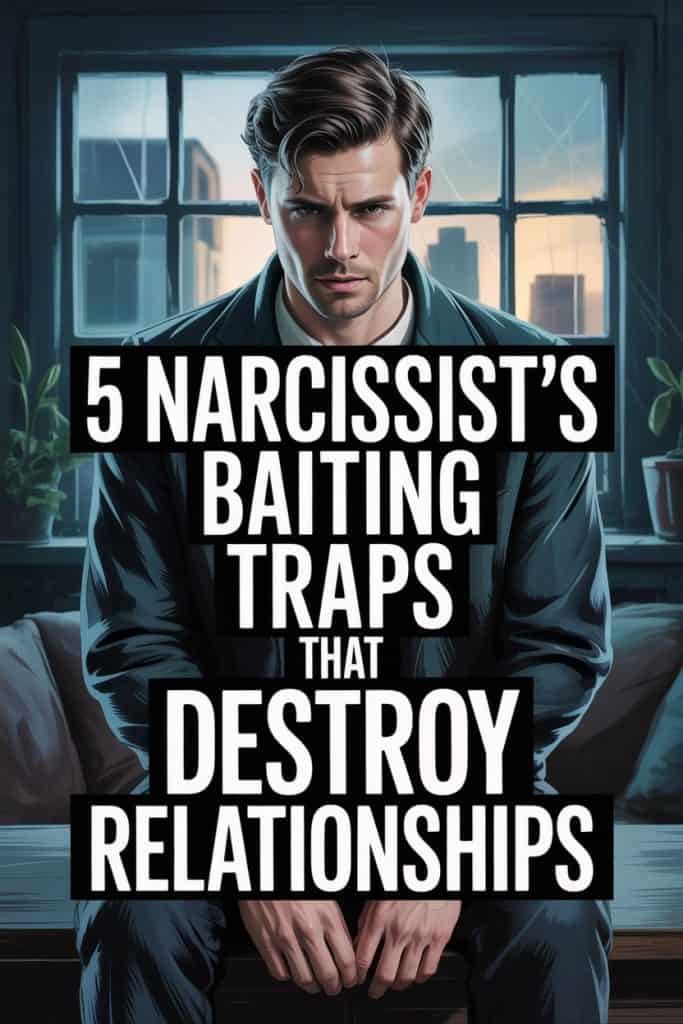Narcissism isn’t just about taking too many selfies or constantly interrupting dinner with stories about high school football glory.
When it comes to relationships, narcissists have a knack for orchestrating drama that would make reality TV producers weep with envy.
There are traps they set—whether consciously or not—that can turn even the healthiest relationships into a swirling pit of self-doubt, confusion, and, yes, probably a few existential crises in the bathroom.
Here’s the lowdown on five narcissist baiting traps, what they look like in the wild, and how to sidestep them without losing your sanity (or your favorite mug in an ‘accidental’ dishwashing incident).
1. The Compliment-Withdrawal Boomerang
It starts with flattery so grand, you’d think you’d just won some mythical Best Partner Ever award. Suddenly, you’re the cleverest, prettiest, and most indispensable person in the room. Bask in it. Revel, even.
Because just as quickly as the love-bombing begins, the compliments disappear.
This isn’t just regular old moodiness. It’s a calculated tactic: build you up, then abruptly stop, leaving you wondering what you did wrong. You start hustling for validation, replaying every conversation like a paranoid sports commentator.
The narcissist, meanwhile, is loving the show.
Why? That uncertainty is deliciously addictive (for them). Your constant effort to regain their praise shifts all the power in their direction. Suddenly, you’re performing emotional gymnastics just to get a pat on the back.
Here’s the secret sauce—don’t play the game. If the compliments drop off a cliff, don’t scale the mountain trying to fetch them back.
Noticing the pattern is the first step to breaking it. Remind yourself that your worth isn’t measured by how often someone else applauds.
2. The “You’re Too Sensitive” Trap
Raise a concern. Any concern. “It hurt my feelings when you made that joke at my expense.” Cue the eye roll, the sigh, and the grand proclamation: “You’re just too sensitive. Can’t you take a joke?”
Congratulations, you’ve just stepped into the most overused, threadbare trap in the narcissist playbook. Gaslighting, anyone? The goal isn’t to resolve anything. It’s to make you question your own emotional compass.
Over time, you start censoring yourself, bottling up legitimate feelings because, apparently, you’re the only person on Earth who could possibly be so “overly emotional.”
Call it what it is—a deflection. The truth? Healthy partners want to know when they’ve crossed a line, even if it stings. If you find yourself apologizing for feeling hurt, pause.
Your feelings are valid, and you’re not required to turn into an unfeeling robot. Push back, gently but firmly: “I’m allowed to feel how I feel, and I’d like us to talk about it.” Watch the discomfort, but stand firm.
3. The Moving Goalpost Marathon
Ever felt like the rules in your relationship are written in invisible ink? What made them happy last week is a source of outrage today.
You finally figure out how to load the dishwasher “the right way” (spoiler: there’s no right way)—and they invent a new rule.
Perfection becomes an ever-shifting target, and you’re trapped in a never-ending marathon. No matter how hard you try, you never quite measure up. This is no accident.
The more you chase their approval, the more control they have over your mood, your actions, and, before you know it, your entire identity.
Want to put a halt to this endless rat race? Stop running. If the rules keep changing, maybe the problem isn’t your effort but their need for control. Set your own standards for what’s “enough.”
If every conversation turns into a debate over some newly-minted rule, call it out: “You keep changing what’s expected. I need clear, consistent expectations if we’re going to work together.”
And please, buy yourself a dishwasher magnet. You deserve one nice thing.
4. The Guilt Trip Express
Forgot to text back within five minutes? You must not care. Didn’t cancel your plans to hang out? Obviously, you’re selfish. The narcissist’s favorite express route runs straight through Guilt Town. All aboard!
This trap is trickier than it looks because guilt is one of those sneaky feelings that can masquerade as love or loyalty. The narcissist turns every ordinary act of self-care or independence into a commentary on how little you love them.
Over time, you start rearranging your entire life to avoid the inevitable “I guess I just don’t matter to you” conversation.
Spoiler: you still get the guilt trip.
The antidote? Recognize guilt for what it is—a tool, not a truth. Nobody should have to sacrifice their own needs, boundaries, or sanity to prove their love. Try this: “I care about you, and I also need to take care of myself.”
It won’t earn a standing ovation, but it’ll keep you on the platform while Guilt Trip Express leaves the station without you.
5. The Silent Treatment Ice Age
Suddenly, there’s radio silence. No texts, no calls, just a frigid wall of nothingness. You rack your brain for what you did wrong. Did you breathe incorrectly? Did you make a sandwich offense?
The narcissist knows exactly what they’re doing. The silent treatment isn’t about needing space; it’s about control. It’s a way to punish you, leaving you anxious, desperate for connection, and scrambling to fix a problem they refuse to name.
Breaking the ice starts with recognizing that silence isn’t always golden. Don’t chase, beg, or apologize for imaginary sins. A simple, “I’m here when you want to talk, but I need communication in a relationship,” puts the ball back in their court.
Resist the urge to over-function. If you’re always the one breaking the silence, you’re doing all the heavy lifting.
Escaping the Circus
No one willingly signs up for a relationship circus, complete with high-wire emotional stunts and lion-taming guilt trips. Yet, these narcissist baiting traps are so subtle that even the sharpest among us can trip over them in broad daylight.
The good news? Spotting the patterns is the first and most powerful step.
Call out the games without drama or apology. Lay down boundaries like you’re building a fence around your favorite vegetable patch.
And if all else fails, consider whether you want to spend your evenings dodging emotional booby traps or actually enjoying your own company.
No relationship should feel like an endless episode of Survivor. Back yourself. Back your gut.
And if you do happen to lose one or two friends in the process, remember: it’s better to eat dinner alone than to be the main course at someone else’s emotional buffet.
Take your power back—tonight.


